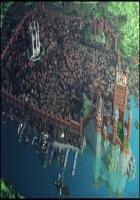It will be seen at once that it would be madness for me to go with ten or a dozen subordinate missionaries by the same way as that which led me to discover Erewhon. I should be imprisoned for typhus, besides being handed over to the straighteners for having run away with Arowhena: an even darker fate, to which I dare hardly again allude, would be reserved for my devoted fellow-labourers. It is plain, therefore, that some other way must be found for getting at the Erewhonians, and I am thankful to say that such another way is not wanting. One of the rivers which descends from the Snowy Mountains, and passes through Erewhon, is known to be navigable for several hundred miles from its mouth. Its upper waters have never yet been explored, but I feel little doubt that it will be found possible to take a light gunboat (for we must protect ourselves) to the outskirts of the Erewhonian country.
I propose, therefore, that one of those associations should be formed in which the risk of each of the members is confined to the amount of his stake in the concern. The first step would be to draw up a prospectus. In this I would advise that no mention should be made of the fact that the Erewhonians are the lost tribes. The discovery is one of absorbing interest to myself, but it is of a sentimental rather than commercial value, and business is business. The capital to be raised should not be less than fifty thousand pounds, and might be either in five or ten pound shares as hereafter determined. This should be amply sufficient for the expenses of an experimental voyage.
When the money had been subscribed, it would be our duty to charter a steamer of some twelve or fourteen hundred tons burden, and with accommodation for a cargo of steerage passengers. She should carry two or three guns in case of her being attacked by savages at the mouth of the river. Boats of considerable size should be also provided, and I think it would be desirable that these also should carry two or three six-pounders. The ship should be taken up the river as far as was considered safe, and a picked party should then ascend in the boats. The presence both of Arowhena and myself would be necessary at this stage, inasmuch as our knowledge of the language would disarm suspicion, and facilitate negotiations.
We should begin by representing the advantages afforded to labour in the colony of Queensland, and point out to the Erewhonians that by emigrating thither, they would be able to amass, each and all of them, enormous fortunes--a fact which would be easily provable by a reference to statistics. I have no doubt that a very great number might be thus induced to come back with us in the larger boats, and that we could fill our vessel with emigrants in three or four journeys.
Should we be attacked, our course would be even ******r, for the Erewhonians have no gunpowder, and would be so surprised with its effects that we should be able to capture as many as we chose; in this case we should feel able to engage them on more advantageous terms, for they would be prisoners of war. But even though we were to meet with no violence, I doubt not that a cargo of seven or eight hundred Erewhonians could be induced, when they were once on board the vessel, to sign an agreement which should be mutually advantageous both to us and them.
We should then proceed to Queensland, and dispose of our engagement with the Erewhonians to the sugar-growers of that settlement, who are in great want of labour; it is believed that the money thus realised would enable us to declare a handsome dividend, and leave a considerable balance, which might be spent in repeating our operations and bringing over other cargoes of Erewhonians, with fresh consequent profits. In fact we could go backwards and forwards as long as there was a demand for labour in Queensland, or indeed in any other Christian colony, for the supply of Erewhonians would be unlimited, and they could be packed closely and fed at a very reasonable cost.
It would be my duty and Arowhena's to see that our emigrants should be boarded and lodged in the households of religious sugar-growers;these persons would give them the benefit of that instruction whereof they stand so greatly in need. Each day, as soon as they could be spared from their work in the plantations, they would be assembled for praise, and be thoroughly grounded in the Church Catechi**, while the whole of every Sabbath should be devoted to singing psalms and church-going.
This must be insisted upon, both in order to put a stop to any uneasy feeling which might show itself either in Queensland or in the mother country as to the means whereby the Erewhonians had been obtained, and also because it would give our own shareholders the comfort of reflecting that they were saving souls and filling their own pockets at one and the same moment. By the time the emigrants had got too old for work they would have become thoroughly instructed in religion; they could then be shipped back to Erewhon and carry the good seed with them.















